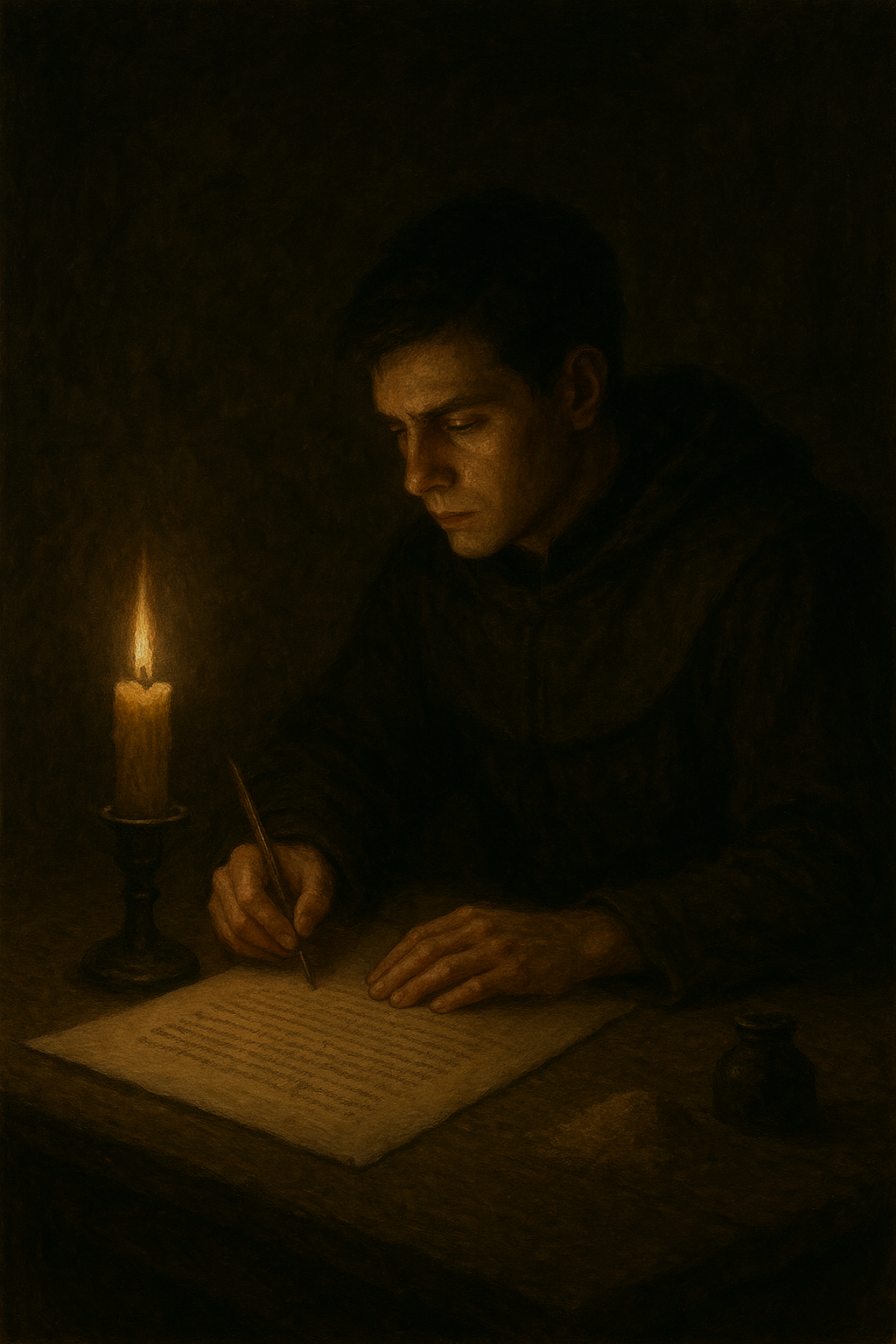It was the dead of night. Venn held the pen steadily, even though his heart was pounding wildly. He still could not believe the fortune that had befallen him: an assignment of such importance, entrusted to him, so young and just beginning his career. He had always been meticulous, orderly, obsessed with details, but he had never imagined that this mania for precision would lead him to write a report destined for the archives of the Republic. An unexpected stroke of luck, leaving him at times incredulous, as if he feared waking from a dream far too grand for him.
The candle on the table cast dancing shadows on the walls, distorting the contours of the room as if even the darkness wished to read his chronicle. The parchment was ready, the fine sand beside the inkwell, every tool in order: there was no room for mistakes. Every word would carry political weight, every omission interpreted, every nuance examined by the Council. And yet, this was exactly what thrilled him: the possibility of inscribing, with his own hand, a truth that would remain in the memory of the city.
He lowered the tip and began:
“Official report on the incident at the Grand Port of the Capital, on the 115th day of the 423rd year of the Republic.”
He drew a deep breath, letting the scent of wax and ink clear his mind. His elegant, precise handwriting flowed across the page, the same that had earned him many praises at the Registry Office:
“In the early afternoon, a series of explosions of yet-unclear origin devastated parts of the western quays. Flames rapidly engulfed warehouses and ships, fueled by reserves of oil and tar. Eyewitnesses report 15 distinct detonations, followed by a partial collapse of the customs tower.”
He paused for a moment. It was his method: reading each sentence three times before moving on. The certainty of form was his only defense against accusations of inaccuracy or bias. Every word had to carry just the right weight. That precision, once mocked by many, now consecrated him. It was his fortune, his weapon.
He resumed, with almost religious zeal:
“According to the most recent reports from the city patrols, there are 113 dead, 56 seriously injured, and 31 missing. Material damages are equally severe: an estimated 15–25 large ships and numerous smaller boats were seriously damaged or destroyed. At least 11 warehouses were affected. Most of the quays and port equipment are compromised, slowing rescue operations and aggravating material losses. The Cheva family, present for the launch of the new merchant ship, suffered heavy losses: only the two daughters survived the disaster.”
His fingers trembled, not with fear but with excitement. He was chronicling an event that would be remembered for generations. Perhaps, one day, young apprentices would study his text as a model of rigor. A thought that both thrilled and frightened him.
Venn lowered the pen, but his mind went to the first signs of hope amid the tragedy. Not all was lost.
“It is reported that Jaren Olsen, a ship captain who survived the disaster, organized the very first rescue efforts with the help of his sailors. Their operations focused on those trapped among the debris of warehouses and damaged ships. Thanks to their swift intervention, some seriously injured were saved before the city patrols arrived.”
The scribe recorded these lines with almost reverent care. Even amid devastation, this act of courage offered a glimmer of order and discipline, an example of how individual responsibility could at least partially mitigate the effects of chaos.
He lowered the pen again, if only for a moment. The most delicate part remained: that concerning the city guards. If he wrote too much, someone would accuse him of alarmism; if too little, of minimizing. He inhaled and wrote carefully:
“Several units of the city guard were dispatched from the port with orders to report regularly to the Grand Palace. Only the last patrols reached their destination, and with significant delay. Consequently, the Council received the first news only several hours after the start of the disaster. The bodies of the missing units have been found in different parts of the city, bearing unmistakable signs of violent encounters. One unit remains unaccounted for, and its members are still being sought.”
He held his breath. That section of the report would make more than one councilor tremble: the loss of the patrols was proof that this was not an accident, but an attack planned with intelligence and cruelty.
And so he wrote the conclusion, with a solemnity that stiffened his back:
“The attack — for it must be called an attack, although the responsible hand remains unknown — constitutes a wound not only to the Capital but to the entire Republic. The balance of merchant routes, already fragile, risks being irreparably undermined. Immediate action by the Council of Five is required, both to reassure the population and to safeguard the honor and security of our nation.”
When he put down the pen, his hands burned from the effort. The fresh ink gleamed under the flickering light, and in that reflection the scribe saw not only a document, but his own destiny. A respected name, a secure place among the greats of the Registry Office, perhaps even the office of Chancellor.
Yet he could not shake the doubt: a career born of pain, blood, and fire… how long could a fortune built on such foundations truly last?
His thoughts immediately went to Eric, the man of miracles. Everyone in the palace called him that because he always seemed to find solutions where others saw only obstacles. But Eric could not accept that the Council had spent precious hours immersed in ordinary matters, unaware of the tragedy consuming the port and the city. The scribe knew that the lines he had just written would weigh upon Eric’s judgment, his anger, and his determination to find a culprit.
For the first time, the young man wondered whether his fortune was, in fact, a dangerous burden.

